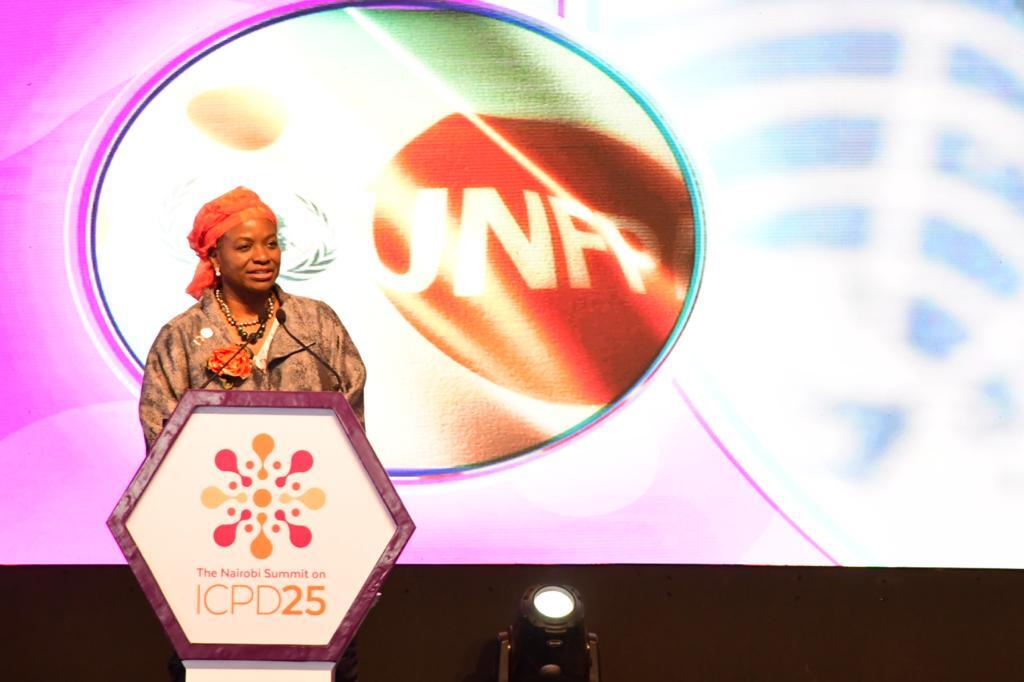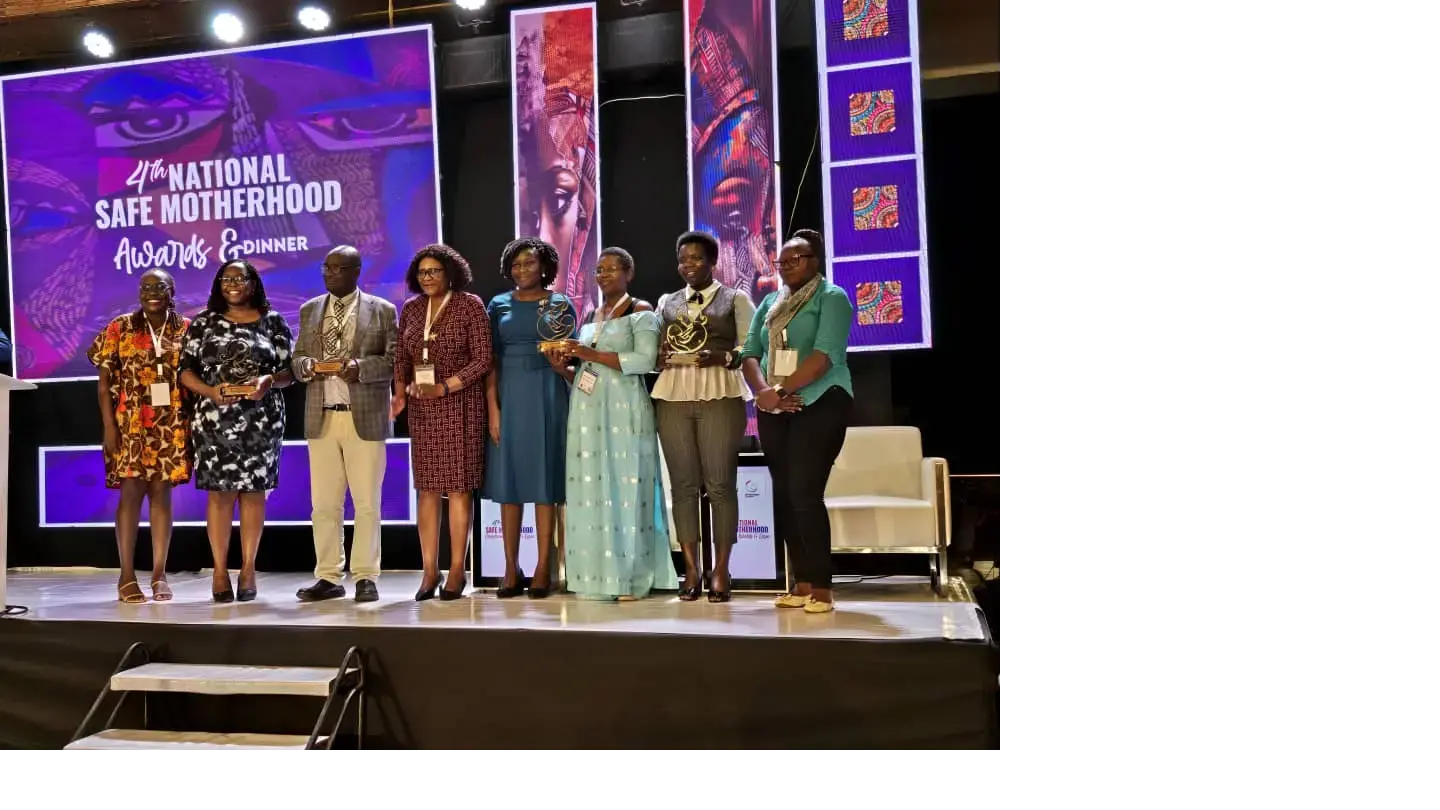Excellencies, distinguished participants, dear friends:
Habari za azubuhi, buenos días, good morning! Bienvenus, welcome to the Nairobi Summit on ICPD25!
Thank you for being here! All roads lead to Nairobi, as we march in solidarity with women and girls all over the world.
We gather to celebrate and draw strength from what we’ve achieved together, as the world recommits to the extraordinary vision of the Programme of Action set forth at the International Conference on Population and Development in Cairo in 1994: A vision of full equality for women and girls, and of reproductive rights for all.
That ICPD vision is still far from reality, and that journey that began 25 years ago in Cairo is far from over.
It’s time now to finish that unfinished business.
The Cairo ICPD began the push to put women and girls at the center of global development strategies. This has paid off time and again.
Since Cairo, maternal mortality is down 44 percent worldwide—meaning four million women are alive today who otherwise would have died in pregnancy or childbirth, good reason to celebrate.
We have come to Nairobi because we refuse to accept good progress as good enough; we insist that a promise made must be a promise kept to girls and women, boys and men, to everyone.
In just the short time I have been at this podium, at least 46 underaged girls were forced to marry.
In these few moments, countless people have been sexually abused. Hurt and traumatized, these victims, these survivors, are more likely to be shamed and blamed, than the perpetrators who attacked them.
In these few moments, at least three women and girls died from complications of pregnancy that are entirely preventable. Lives cut short, for no other reason than our collective failure to provide the health care they need and deserve, as is the right of every human being.
I say, let our message be clear: No more.
The reproductive rights of women and girls are not up for negotiation. And we shall protect and uphold them.
We will do it because the Sustainable Development Goals depend on it.
We do it because we cannot hope to end poverty and hunger, to improve health and human well-being, to guarantee quality education, or achieve peace and prosperity until every woman and girl can live in full equality, with dignity and respect.
We will do it because strengthening our societies, growing our economies, and importantly, combating climate change—all of it depends upon women and girls taking control over their bodies, their choices, and their futures.
Yet, there is a fundamental reason we will uphold sexual and reproductive health and rights. We will do it because it is right.
And the world should not wait another 25 years. Reproductive rights are human rights, and we will not back down!
Excellencies, Dear Friends
Somewhere in the world right now, there’s a girl overflowing with boundless potential. Picture her. In India. Nigeria. Fiji. Portugal. Panama. Kazakhstan. Or right here in Kenya.
What does her future hold?
Will she have the freedom to decide who, when, and if she marries? Or will she be forced to abandon her education and wed a man many times her age?
Will she embark on her journey to womanhood, safe in her home, at school, and in her community? Or will she end up abused, as happens to one in every three women and girls in their lifetimes.
Will she learn the truth about how her body works, and how to protect her health? Or will her world be turned upside down upon discovering that she is pregnant, ignorant of how it happened?
The answers are up to you. The answers are up to us.
I thank the 164 member states, here voluntarily out of good will and concern, not to negotiate new documents or language, but to uphold existing agreements, and to share and learn from each other. The will for change emanates from understanding. I encourage you to act upon the evidence as you determine and implement what is best for your countries.
I hail the many leaders at this Nairobi Summit—leaders of countries, communities and organizations. We salute Kenya, our host, and we thank you, President Uhuru Kenyatta, for your leadership and vision.
We salute Denmark and thank Crown Princess Mary, Prime Minister Mette Frederiksen and Minister Rasmus Prehn for Denmark’s resolute support of this Summit and unwavering support of sexual and reproductive health and rights for all.
United Nations Secretary-General António Guterres, a true feminist, is represented today by Deputy Secretary-General Amina Mohammed, global champion of youth and the girl child and a torchbearer for women, peace and security and the Sustainable Development Goals.
And we salute you and all the partners bringing new ideas and new resources to make rights and choices a reality – from the private sector, civil society and faith-based organizations, to you, the young people present here in your numbers. You are leading, challenging, inspiring and pushing us to go further.
Let us applaud the feminists who ignited a movement from Cairo to Beijing until today – you champion rights and choices so every girl may fulfill her dreams.
I urge us to heed the interests of that girl in the solutions we devise, her interests in the Nairobi Commitments we announce, her interests in decisions we make in the days to come.
The way forward is by focusing on one number only. And for UNFPA that number is zero.
Zero unmet need for contraception, so every woman and adolescent girl can decide for herself whether or when to get pregnant, and how many children to have.
Zero preventable maternal deaths, so no woman in the world will have to die for want of reproductive health care.
Zero gender-based violence. Zero cases of female genital mutilation. Zero child and forced marriages.
From this day forward, let us join hands to consign rape and sexual assault and femicide to the past.
It will take comprehensive, innovative population data to zero in on those who are furthest behind.
That is the vision set out in the Nairobi Statement. Zero is the only acceptable target and it is within our power to achieve.
Women are marching for gender equality the world over, demanding full respect in the home, in the workplace, and on the street. Let’s commit the political will and make the smart investments to get the job done.
Ours is an inclusive agenda. We will leave no one behind.
You may be HIV positive; we march with you. If you are a person with disabilities, your fight is our fight. Whether you are indigenous, of African descent, from an ethnic or religious minority, if you’re displaced, a migrant or refugee, we stand with you. If you are of diverse sexual orientation or gender identity, we respect your human rights.
We the peoples, march forward for freedom and justice, together.
Nobel laureate Wangari Maathai once said, “Until you dig a hole, you plant a tree, you water it and make it survive, you haven’t done a thing. You are just talking.”
She was referring to the Green Belt Movement she founded here in Kenya, which has planted millions of trees. Yet, Professor Wangari was speaking too of something far more profound. She was referencing the work—the difficult, messy, tiring, day-in, day-out work— it takes to act, for real change to take root, to get things done!
Today, we stand united to declare: the time to act is now. Never lose sight of who we are fighting for: anyone excluded, neglected, abused, forgotten. Sexual and reproductive health and rights matter because women and girls matter, as everyone matters.
Years from now, may it be said that the Nairobi Summit was not about talk; it was about doing. Let them say we did the work; we kept the promises of the ICPD and 2030 Agendas; we planted the trees of rights and choices for all.
The Nairobi Statement and the 1000-plus Nairobi Commitments so far, are powerful signals of our intention to secure reproductive health and rights and choices for all, once and for all!
Adelante! We keep moving forward. We will not retreat. We will never give up.
We are in a race to the finish line, and we shall prevail!
Thank you! Nashukuru sana.





